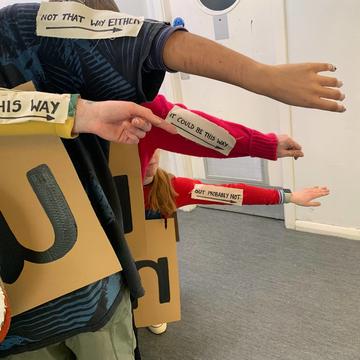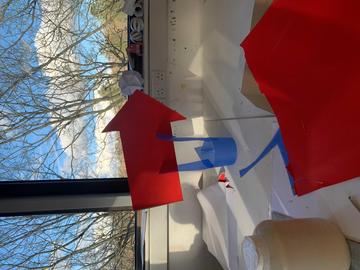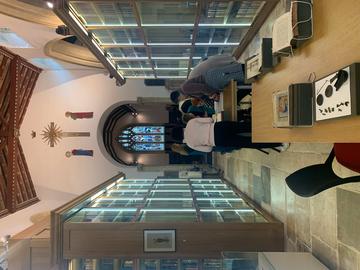Over the last four months the ‘Finding our Way’ project has taken us to archives, libraries and workshops, and to encounters with a variety of different people to bring the history of African Caribbean Oxford to life.


In February we first met with Junie James and Euton Daley to look at historical material, archives, and to think about how we could creatively respond to the narratives presented. What struck me, was the importance of taking historical material that sometimes felt distant and indigestible, and translating it into forms that would engage a public unfamiliar with this history. The prospect of an open-ended brief felt exciting but we were also aware of the responsibility it entailed to respond to the voices and histories of others. ‘Using poems and group drawings as introductions, we felt we were learning to listen, understand, and to really hear.’ (Jane Gallagher)
We heard about the experiences of the Windrush generation arriving in Oxford. The Windrush generation were officially invited to come to the UK to help rebuild postwar Britain. However when they arrived, they were met with prejudice and a hostile environment. For example, we heard powerful testimonies from the past; Irma James, the day after she arrived, went to her local church where she was politely asked not to return because the vicar was worried that the rest of the congregation would stop attending church if Black people attended.
We reflected on the themes of uncertainty, conflicting messages and dead ends. We explored how to move between media: responding to a poem with a visual language, mark-making, using colour. It was important to think about how these ideas could be presented visually, through the form of ‘wearable archives’, enabling the archives to be part of the performance, and sharing our knowledge with the public in an interactive and alternative way. As Maya Freewood commented, ‘we were almost finding our way between two parts of the project - researchers at Oxford university and Euton Daley’s performance. How do we bridge the gap with our art?’ Our Not This Way hat, ‘Not this way, Not that way either, Maybe this way, But probably not’ wearable clothes tags, wearable signposts, felt like innovative and inventive ways to play with words and movement.

Our archive visit to Balliol’s Historic Collections Centre made us realise that only fragments of the Oxford African Caribbean history remain. Trying to find our own way, reconstructing a narrative that has never been fully recorded was both frustrating and inspiring. We became acutely aware of fragments and gaps. The archival material that we were working with shed light on the past but everywhere there were absences and lost voices. Interestingly, it was sometimes the power of these gaps that inspired us. ‘Rather than trying to fill them in, sometimes the lack of information and written history is the most poignant thing.’ (Maya Freewood)
Our meeting in the print room amplified our sense of excitement at drawing on the experiences of the Windrush generation. Using archival images, we abstracted colour, shape and mark in print to reanimate individual, often unnoticed moments, and elevate them into images that could bring to life the experience. The next stage took a similar approach to forgotten names; we printed and collated a list of African Caribbean people who had contributed to the fight for awareness and justice, which we then sewed into a scroll of honour for the performance. This was a repetitive task, but precisely that sense of repetition was moving in itself - the feeling that these names stood for so many more that had been lost.
The performance at All Souls College brought all these things together. It was moving and empowering to see our work being displayed in an environment so redolent with the very history we were confronting. Not only has the project increased our knowledge of the experiences of African Caribbean people in Oxford; it also throws light on the insidious racism and white supremacy (Junie) still operating today. As a group we feel chastened; we have learnt a great deal, expanded our empathy, but are more aware than ever of how much still needs to be done. This is a start however, and this project makes us feel that our art could truly help change the narrative.
Image credit © Fisher Studios